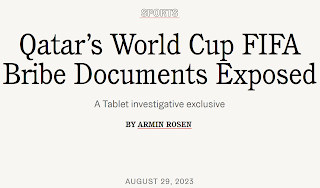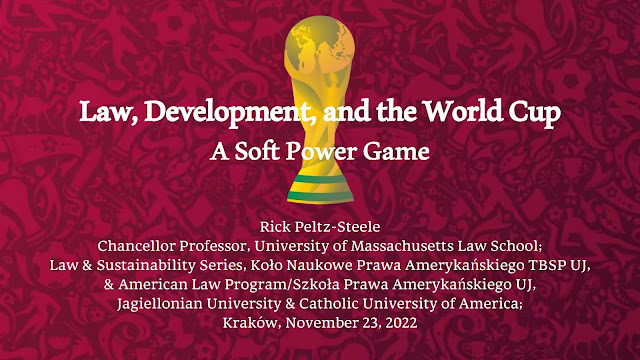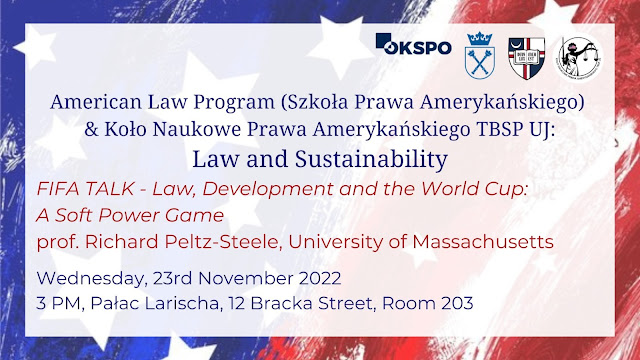 |
Cristiano Ronaldo plays for Real Madrid against Barcelona in 2011.
Jan S0L0 via Flickr CC BY-SA 2.0
|
U.S. Soccer and
the Fédération Internationale de Football Association (FIFA) will have to defend an antitrust action in federal court for refusing to permit a Spanish La Liga match on U.S. soil, the Second Circuit
ruled in March.
In 2017, world famous football (soccer) clubs Real Madrid and Barcelona faced off in an exhibition game in Miami. The match was fabulously lucrative for the commercial interests behind it, including organizer Relevant Sports, LLC, based in New York.
World sport likes the United States, because our infrastructure practically prints money. Americans, especially the top echelons of the wealthy, have been habitualized by our unregulated and often subsidized sport-and-entertainment monopolists to pay more than people elsewhere in the world to see live events, both directly for seats and indirectly in media rights.
Incidentally, that's the principal reason that bringing the FIFA (men's) World Cup back to North America in 2026 was not really a hard sell, notwithstanding modest public enthusiasm and the theater of the global bidding process. The 2026 co-hosts, the United States, Canada, and Mexico, likely did not even have to pay the
half-billion dollars that Qatar apparently spent, mostly to FIFA executive committee members, in, uh, let's say, "incentives," in siting the 2022 World Cup (
about my World-Cup-2022-contemporaneous lecture;
Qatar on this blog): check out the
investigative exclusive by Armin Rosen for Tablet (link from inset), published late last month, using U.S. court records in collateral matters.
Understandably, then, Relevant Sports wanted to maintain the momentum of the 2017 exhibition match. The company proposed that the Spanish La Liga subsequently might site a regular-season, full-stakes match in the United States.
However, FIFA rules say that a match cannot be held in a country foreign to both sides without the approval of the football federation in the host country. U.S. Soccer said no.
Relevant sued, alleging that the rule improperly protects domestic football from being overshadowed, and therefore diminished in interest and income, by high-profile competitors. U.S. Soccer and FIFA defend the system on the merits under antitrust law, and, saliently in this intermediate disposition, argued that the FIFA "rule" is not really a rule, because FIFA doesn't make the decision for U.S. Soccer or La Liga. They're free to make their own decisions, notwithstanding potential adverse consequences, such as exclusion from international competition for players, teams, or federations that don't play ball.
The instant Second Circuit decision is limited. The court remanded the antitrust claim to proceed, recognizing that FIFA's rule is rule enough to represent the kind of concerted action in violation of antitrust law that Relevant alleges.
Earlier this week, I wrote about Cory Doctorow's enthusiasm, which I share, for the federal government's antitrust agenda—including the Justice Department investigation of Google. (I canceled my Google Nest Aware subscription upon the 25% rate hike. Google's not the only game in town. Yet.) U.S. Soccer's loss in the Second Circuit represents a judicial step in the same right direction.
I'm not an antitrust expert. But to my relatively lay eyes, the fact that the federal district court dismissed the case in 2021 on the faint theory that U.S. Soccer was not formally bound by FIFA's command demonstrates how appallingly far U.S. antitrust law has strayed from basic fair-market principles. Or maybe the court just didn't understand the governance system in world sport and its facility for subverting the laws of nations.
 |
USWNT celebrates in times happier than this year's World Cup.
rachael.c.king via Flickr CC BY 2.0
|
The U.S. Soccer position in the litigation to me demonstrates furthermore a fundamental misunderstanding of what it will take to make football successful in America. American soccer advocates often wonder aloud why the sport seems to stall again and again, even after the men's World Cup in the United States in 1994 and the astonishing run of the U.S. Women's team in an unprecedented four World Cup titles.
To be sure, there are many, many reasons for the frustrating cycle of revving and stalling. But equally surely, one of those many reasons is the short-term greed of commercial actors that works a detriment to long-term development.
I've written previously about this problem in the context of media rights. When NBC acquired the rights to English Premier League football, the broadcaster divvied up matches among its many media properties based on the popular appeal of each. NBC's strategy was to leverage interest in the league to sell separate subscriptions to multiple services: NBC, NBC Sports, (at one time, "NBC Gold,") Peacock, USA, Telemundo, Universo.
The network either didn't consider or doesn't care what that model looks like from the customer's perspective. Football in a place such as its home U.K. (at least before U.K. media companies such as Sky started merging with U.S. media giants and took sport away from the publicly minded BBC; that's another story) maintains a multi-generational foothold because supporters follow their teams.
Divvying up the matches makes it impossible in the United States for a viewer to follow a team. Each week, one gets whatever match a selected service happens to carry, based on its level of market appeal. If you subscribe to a middle-tier service and your team starts to lose, you might get more matches. If your team starts winning, and you start becoming more engaged, you find yourself suddenly deprived of matches.
That market behavior doesn't build a fan base. For American football or basketball, maybe there are enough viewers who will watch any game because they love the sport. But Americans don't yet love soccer that much. Sport-market development requires fostering two interrelated conditions at the same time: public enthusiasm for the sport, and public enthusiasm for a team. Neither can thrive without the other.
U.S. Soccer's refusal to permit La Liga to play a match on U.S. soil also is self-defeating, if for the converse strategic blindness. Both media rights usurpers and U.S. Soccer, focused on short-term profits, are dampening American enthusiasm by impeding U.S. viewers' access to the highest level of play in the world, in the Premier League and La Liga. While NBC's strategy deprives Americans of the opportunity to root for a team, the U.S. Soccer strategy deprives Americans of the opportunity to root for the sport.
Again, neither can thrive without the other. U.S. Soccer is trying to protect Major League Soccer and the federation's underage and lower divisions. The federation reasons coldly that someone who buys a $500 La Liga ticket will skip five or ten $48 Tampa Bay Mutiny matches.
They're wrong. One of my U.S.-based family is a card-carrying member of the Toon Army, a dedicated supporter of Newcastle (U.K.) United FC. He traveled domestically to see Newcastle play an exhibition match in the United States this summer. Being a Newcastle supporter has made him a more, not less, enthusiastic supporter of his nearby D.C. United and the U.S. men's and women's national teams. With access to the matches of each, live and on TV, he's more likely to spend money on all of them.
Antitrust law is not a device to make commercial actors prioritize long-term interests over short. To the contrary, if NBC and U.S. Soccer put themselves out of business, that's a healthy outcome for the free market. But if antitrust inadvertently compels U.S. Soccer to up its game and compete for eyeballs by actually developing the sport, rather than constraining consumer choice, then that's an outcome I can get behind.
The case is Relevant Sports, LLC v. U.S. Soccer Federation, Inc. (2d Cir. Mar. 7, 2023). U.S. Circuit Judge Raymond J. Lohier, Jr.., wrote the opinion of the unanimous panel that also comprised Chief Judge Livingston and Judge Lynch. In 2017's "El Clásico Miami," Barcelona bettered Real Madrid 3-2.



















.jpg)





